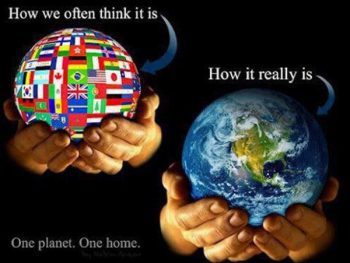 December 18th, 2020
December 18th, 2020
Guest writer for Wake Up World
Rusty Schweikhart was a member of the Apollo 9 space mission in March 1969, which carried out tests for the moon landings that took place later that year. Like many astronauts, he found the experience transformational.
One of his tests was to do a spacewalk around his lunar module, in which he floated 160 miles above the earth. As he gazed at the planet circling below him, he experienced a profound shift in perspective. Like all of us, he had been brought up to think in terms of different countries with borders between them. But now he lost his identity as an American astronaut, and felt “part of everyone and everything sweeping past me below.” As he described it:
[pro_ad_display_adzone id=”110028″]
“When you go around the Earth in an hour and half, you begin to recognize that your identity is with the whole thing…You look down there and you can’t imagine how many borders and boundaries you cross, again and again and again, and you don’t even see them…[F]rom where you see it, the thing is a whole, the earth is a whole, and it’s so beautiful. You wish you could take a person in each hand, one from each side in the various conflicts, and say, “Look. Look at it from this perspective. Look at that. What’s important?”
Rusty Schweikhart’s perspective seems very pertinent at the present time, with a resurgence of nationalism in many parts of the world. Donald Trump made nationalism (under the banner of “America First”) the main focus of his policies, while in the UK, where I live, Brexit has shown that nationalism is still thriving.
The Fallacy of Nationalism
Perhaps, you might say, Schweikhart’s perspective makes sense from space, but surely, here on Earth, it’s inevitable that we live as different national groups, with different traditions and interests, and with borders between us.
However, the idea that of distinct groups of human beings who should pursue their own interests independently has no basis. There are countless different species on the surface of this planet. One of these is the human race, with approximately seven billion members. Objectively speaking, there are no nations, just different groups of homo sapiens who live on different areas of our planet’s inhabitable land. In some cases, there are natural borders formed by sea or mountains, but in many cases, borders between nations are simply abstractions, imaginary boundaries that have been established by agreement and/or conflict.
The idea of distinct and separate human groups makes no sense from a linguistic point of view. From the 18th century onwards, students of language have noted marked similarities between the languages of peoples who are geographically for apart. For example, it is long been known that there are strong resemblances between English, Celtic languages (like Welsh or Irish), Persian and Hindi, suggesting that the peoples who speak these language are descended from the same original group.
Such linguistic similarities go back even further. Scientists have identified fundamental grammatical structures and vocabulary shared by all the human race’s languages, suggesting that all languages stem from one original human language, dating back 50,000 years or more. (This is sometimes referred to as the proto-human language.) This fits with the widely accepted view that our species originally developed in the Horn of Africa between 300,000 and 200,000 years ago, and migrated into the rest of the world in a series of waves (the most significant of which took place about 60,000 years ago).
In other words, if there was an ancestry website which could trace our lineage back tens of thousands of years, right back to the very beginning, we would find that we all have the same great-great (followed by many other greats) grandparents. Both geographically and linguistically, we have a common source. We all stem from the same original human group.
In other words, both geographically and linguistically, all human beings have a common source. We all stem from the same original human group. This means that the concept of different ‘races’ is a fallacy. We are just one species who migrated to different parts of the planet’s surface, and developed some different traits due to the different environmental conditions we encountered in different areas of the Earth.
It means that the concept of nationality is a fallacy too. It’s true that some groups – who ended up living on the same area – have integrated and organised themselves into cohesive groups, operating under the same social and administrative systems. But the idea that these groups are distinct is a fallacy. The term ‘English,’ for example, has very little meaning. It just means at some point in the past, some human beings migrated out of Africa into Europe or the Near East, and slowly moved northwards. Some groups stayed in northern Europe, while at some point (beginning about 6000 years ago) a number of groups sailed off the coast of Europe and chanced upon an island. Over the years, lots of other groups crossed over (from modern day Scandanavia, France, Denmark, Germany and so on) and mingled together on the island. The name ‘England’ comes from a Germanic tribe, the Angles, who migrated to the island around the 5th century AD.
The term ‘American’ has little meaning either. ‘North America’ is simply the Northern part of a large continental landmass that, until a few centuries ago, was inhabited by groups that came to be known as ‘American Indians’ or ‘Native Americans.’ From the 16th century onwards, waves of immigrants from different parts of Europe (and other parts of the world) arrived on the shores of the landmass. They gradually conquered the Native Americans and took over the landmass, supplanting their ancient cultures with a new culture based on European principles. The ‘founding fathers’ made a conscious attempt to create a new country, and to integrate all of the immigrants under one governmental system, with the same social principles.
All of this means that, although we might feel distinct and different, all human beings are essentially one and the same. We speak closely related languages, have the same fundamental biological characteristics, and the same psychological and spiritual nature.
The Psychological Basis of Nationalism
So where does nationalism stem from? If we are essentially one and the same, why do human beings have a tendency to separate themselves into groups, and to fall into conflict and competition with each other?
Humans have always lived in tribes, but it’s a mistake to assume that people identified strongly or exclusively with their tribe and treated other groups with hostility. Contemporary hunter-gatherer tribes who follow the same lifestyle as prehistoric human beings (and can therefore be seen as representative of our species’ ancient past) are fairly fluid, with changing membership. Different groups interact with each other a lot, regularly visiting each other, making marriage alliances, and sometimes switching members. This makes it seem unlikely that nationalism is a kind of innate impulse that we have inherited from our ancestors.
In my view, it makes more sense to explain modern day nationalism in terms of psychological factors. There are some clues from the psychological theory of Terror Management. This theory — which has been validated by many studies — has shown that when people are made to feel insecure and anxious by being reminded of death, they tend to become more concerned with identity values such as nationalism, status and success.
Nationalism tends to become more intense in times of crisis and uncertainty, which also suggests a link with insecurity. This happened in Germany after the First World War, when extreme poverty and economic instability – and the perceived humiliation of the Treaty of Versailles which ended the war – encouraged an intense isolationism and nationalism which was exploited (and further intensified) by the Nazis. It also occurred in the old Yugoslavia in the early 1990s. The country had been badly hit by the foreign debt crisis in the 1980s, and the economic situation grew worse after the end of communism, when other ex-communist countries were competing for trade with the West. At the same time, another effect of the end of communism was to create an ‘identity vacuum,’ together with a sense of disorientation that was common throughout the old communist blog. These factors encouraged a renewed sense of ethnic identity, and a desire for independence, which was exploited by the media and by politicians, and ultimately led to war.
It seems that an increased sense of insecurity brings a stronger need to attach ourselves to conceptual labels, in order to strengthen our sense of identity. We also gain security through the feeling of belonging to a group. To feel that we are members of a specific group, with shared beliefs and conventions, assuages our sense of separation. And this sense of group identity is strengthened by perceiving ourselves in opposition to other groups. To have rivals and enemies helps us to define ourselves more clearly and strongly. It also helps to reinforce group identity, by providing common goals, and a common purpose.
In my book, The Leap, I suggest that it’s normal for human beings to experience a fundamental sense of separateness and incompleteness — a sense of being enclosed inside our own mental space, with the rest of the world “out there” on the other side. This makes us feel as if there is something missing, or as if something is not quite right. It also make us feel fragile and vulnerable. We feel threatened by the vast, complex and overpowering world outside us (and by our own mortality, as Terror Management Theory suggests).
As a result, the need for identity and belonging is generally quite strong in us. This explains why human beings have a tendency to divide themselves into groups, and why we relish the feeling of otherness and rivalry towards other groups. It explains why some English people are relishing our country’s new sense of division from Europe, and why some politicians and newspapers are already relishing the prospect of competition and conflict with our European neighbours. It explains the appeal of Donald Trump’s ‘America First’ ideology to a sizeable proportion of the US electorate. (This also partly explains the appeal of religion, which certainly provides a powerful sense of group identity.)
On an individual basis, it is likely that people who feel the strongest sense of separation, and the highest levels of insecurity and anxiety, are the most prone to nationalism, racism and to fundamentalist religion.
Beyond Nationalism
One pertinent finding from my own research as a psychologist is that people who experience high levels of well-being (together with a strong sense of connection to others, or to the world in general) do not report a sense of group identity. I have studied many people who experienced profound personal transformation following intense psychological turmoil, such as bereavement or a diagnosis of cancer. I sometimes refer to these people as “shifters,” since they appear to shift up to a higher level of human development. They undergo a dramatic form of post-traumatic growth in which their lives become much richer, more fulfilling and meaningful. They have a new sense of appreciation, a heightened awareness of their surroundings, a wider sense of perspective and more intimate and authentic relationships.
One of the common traits of shifters is that they no longer have a need to define themselves in terms of nationality, religion or ideology. They no longer feel that they are American or British, a Muslim or a Christian or a Jew. They feel equal kinship with all human beings, beyond conceptual distinctions. If they have any sense of identity at all, it is as global citizens, members of the human race and inhabitants of the planet Earth, beyond nationality or border. The shifters have lost the need for group identity because they no longer feel separate, and so have no sense of fragility and insecurity. One ‘shifter’ who lives in the mid-west of the US described himself as “a citizen of the cosmos. I don’t have any sense of regional or political identity – and around where I live a lot of people do.”
These people have no need for group identity because they no longer feel separate, and so have a much reduced sense of fragility and insecurity. They have an interconnected sense of self, a shared sense of identity with other human beings, and the whole world itself.
The Urgency of Trans-Nationalism
At the moment, we are living in a time of unprecedented crisis, facing an array of environmental problems that threaten our future as a species. If we are to deal with these issues, it is imperative that we transcend the illusion of different national identities. Otherwise we will be unable to effectively cooperate. We will continue to waste our energy and attention on trivial inter-group conflicts and rivalries rather than focusing on our major collective problems.
Like the world itself, our most serious problems have no borders. Problems like the coronavirus pandemic and climate change affect us collectively, and therefore can only be solved collectively, from a trans-nationalist approach. They can only be solved from the worldview that Rusty Schweikart experienced while floating high above the Earth: from the perspective of one species, living on the surface of a small oasis-like planet in the vast emptiness of space, without borders or boundaries.
Nationalism is a psychological aberration, and we owe it to our ancestors, and to our descendants — and to the other species, and to the Earth itself — to move beyond it.
Originally published at Psychology Today and reproduced with permission.
Recommended articles by Steve Taylor, Ph.D:
- Do Psi Phenomena Exist? A Debate (Part One)
- Do Psi Phenomena Exist? The Debate Continues
- David Ditchfield’s Remarkable Near Death Experience
- Waking Up – Are Spiritual Experiences Becoming More Common?
- The Guru Syndrome: When Spirituality Turns Sour
- Can Suffering Make Us Stronger?
- Transformation Through Dying: The Aftermath of Near Death Experiences
- Elation: The Amazing Effect of Witnessing Acts of Kindness
- The Power of Forgiveness: The Transformational Effect of Letting Go of Resentment
- The Power Of Silence
About the author:
Steve Taylor is a senior lecturer in Psychology at Leeds Beckett University, UK. His latest books in the US are The Calm Center and Back to Sanity: Healing the Madness of the Human Mind. He is also the author of The Fall, Waking From Sleep, and Out Of The Darkness. His books have been published in 19 languages. His research has appeared in The Journal of Transpersonal Psychology, The Journal of Consciousness Studies, The Transpersonal Psychology Review, The International Journal of Transpersonal Studies, as well as the popular media in the UK, including on BBC World TV, The Guardian, and The Independent.
Connect with Steve at StevenMTaylor.com.
[pro_ad_display_adzone id=”110027″]







